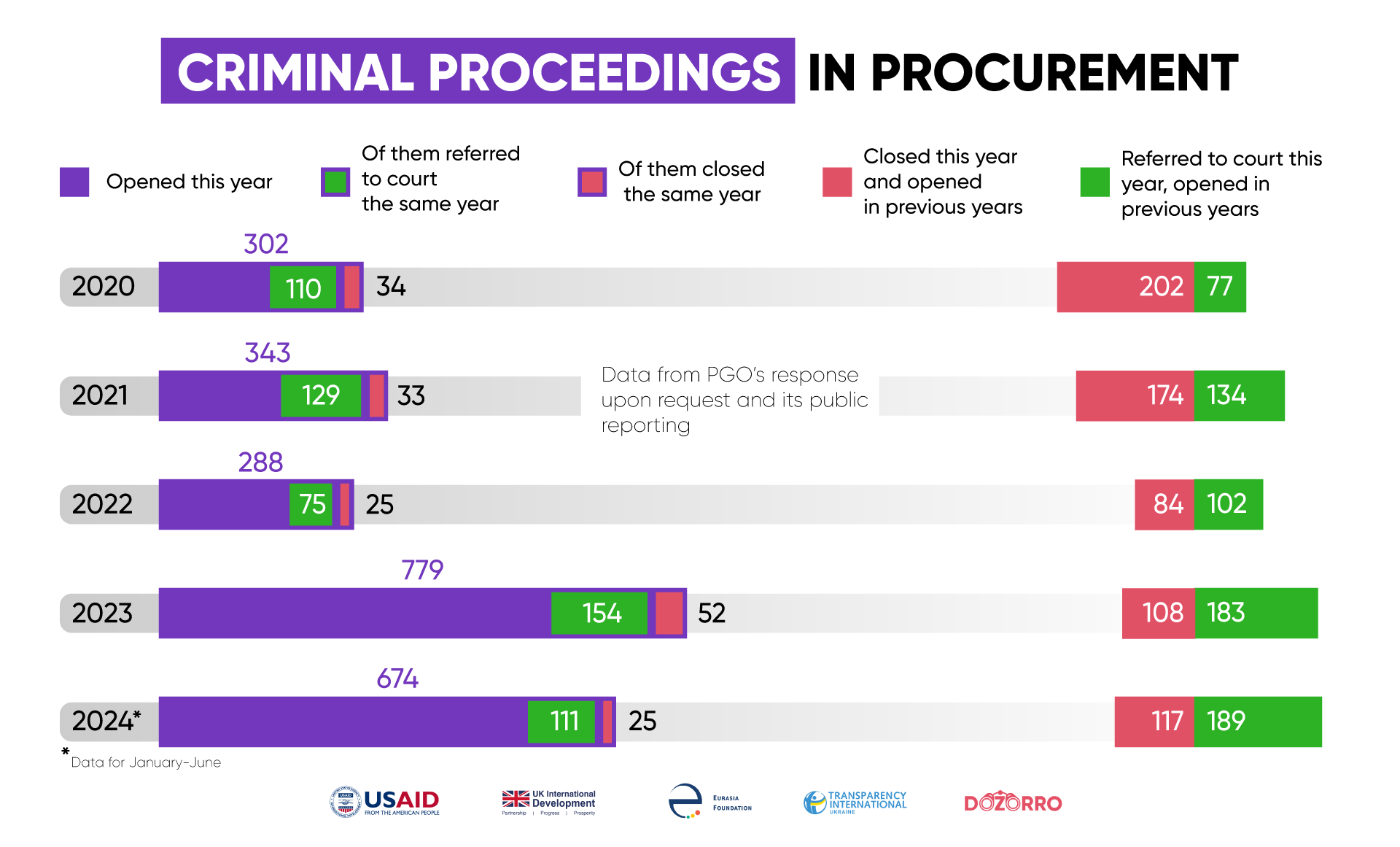Is There Increase in Crimes within Public Procurement?
“Law enforcement officers opened criminal proceedings regarding alleged overpayment at a tender.” You have definitely seen such a headline at least once. Perhaps it was not about overpayment but about corruption or fictitious contract implementation. But what happened next? The DOZORRO project found out how often criminal proceedings were opened in Ukraine regarding alleged crimes in public procurement and how it all ended.
Who is responsible for violations of procurement legislation?
The authorized person who announced the procurement, as well as the head of the enterprise, institution, or organization who signs the agreements, may be held liable. For violation of the law, in particular, the following types of penalties are provided:
- Administrative—in the form of a fine;
- Criminal—up to restriction of liberty or imprisonment
Criminal liability generally applies to all participants involved in the offense. But most frequently, it applies to the head of the procuring entity that announced the procurement transaction. Offenses that cause liability:
- Misappropriation, embezzlement, or conversion of public property by malversation. These offenses are regulated by Article 191 of the Criminal Code (CC). They are punishable by real imprisonment for a term of 5 to 8 years, and to 12 years with confiscation of property under certain circumstances.
- Forgery in office. According to Article 358 of the Criminal Code, forgery is considered to be the intentional introduction of false data into the tender documentation or the issuance of false documents. For this, an official may be fined or have their liberty restricted for up to 3 years. If the unlawful actions of the official caused grave consequences, they will face imprisonment for a term of 2 to 5 years and a fine.
- Neglect of official duty. Regulated by Article 367 of the Criminal Code, it consists in failure to perform or improper performance by an official of his/her official duties due to negligence, where it caused any substantial damage. Depending on the consequences, the perpetrator may be punished by a fine, restriction of liberty for up to 3 years, or imprisonment for up to 5 years with restriction of the right to hold certain positions or engage in certain activities.
- Accepting an offer, promise or receiving an improper advantage by an official, as well as a request to provide such an advantage. To put it simply, it's about taking or extorting a bribe. It is regulated by Article 368 of the Criminal Code. Depending on the size of the improper advantage, it may be punishable by a fine, imprisonment for up to 12 years with deprivation of the right to hold certain positions or engage in certain activities, with confiscation of property.
For reference, significant damage is considered to be one hundred or more times higher than the non-taxable minimum income of citizens (in 2024, this limit is UAH 151,400). Grave consequences are those that are two hundred and fifty or more times higher than the non-taxable minimum income of citizens (in 2024, it is UAH 378,500).
Criminal proceedings should undergo the following main stages:
- pre-trial investigation;
- trial;
- appellate and cassation instances (optionally)
- decision enforcement.
The pre-trial investigation begins when the information about the offense is entered into the Unified Register of Pre-Trial Investigations. According to its results, the prosecutor must either close the criminal proceedings or transfer the indictment to the court, where the person's guilt will be established.
Is There Increase in Crimes in Public Procurement?
Recently, a relatively steady number of criminal cases have been opened in Ukraine—within 700-800,000 annually. In 2022, in the first year of the full-scale war, there were slightly fewer of them—606,000. However, in the field of public procurement, there has been a surge in the registration of new criminal proceedings over the past two years. If, shortly before the full-scale invasion, 300–340 proceedings were opened per year, then in 2023, the number of registered criminal proceedings in this field reached 779. There are already 674 for the first half of 2024. That is, the share of such cases increased from 0.04% to 0.19%.
However, we cannot state only based on these numbers that crime has increased dramatically in procurement transactions; we need to look at what happened to them next.
After registration, law enforcement officers investigate a possible criminal offense more deeply. They can close the proceedings if they see that, in fact, there is no crime. In the past years, between 110 and 240 criminal cases have been closed. For some of them, it happened quite quickly—in the same year as they were opened. There were about 25 to 50 such cases. In other criminal proceedings, more time elapsed between registration and closure.
After the pre-trial investigation, the case is transferred to the court. Considering the duration of the previous stages, this may not happen in the same year when the proceedings were registered, but in one, two, or even more years. Actually, in recent years, 20% to 40% of open criminal proceedings were transferred to the court in the same year. They accounted for one-third to a half of the cases that were referred to court during this period. The rest were from previous years.
One of the indicators of whether crime has really increased in public procurement could be the number of indictments. After all, it is the court that decides whether a person is guilty. However, public authorities do not have the statistics on public procurement. They keep records of sentences under the articles of the Criminal Code, but not in the fields in which the crime was committed. This is a shortcoming because, without the number of indictments and acquittals, it is impossible to comprehensively assess the level of crime in the field, as well as the quality of pre-trial investigations.
We at DOZORRO monitor the progress and results of those criminal proceedings that have been registered following our appeals.
What about the cases that were opened following DOZORRO's appeal?
In 2023, 41 criminal proceedings were opened following our appeals. This is 5% of all cases in this field registered that year. 40 proceedings concerned overpricing (overpayment) in public procurement. As of spring 2024, indictments were sent to the court in 2 cases; 5 were closed lacking corpus delicti. The remaining 34 proceedings were still under pre-trial investigation.
In 2024, 22 criminal proceedings have already been opened following the appeal of the DOZORRO team.
Most often, law enforcement agencies qualified the offenses we reported under Article 191 of the Criminal Code (misappropriation, embezzlement or conversion of public property by malversation) and 364 of the Criminal Code (abuse of power or office).
Instead of conclusions
The number of criminal proceedings in procurement has recently increased drastically: in 2021, 343 were registered; last year, this number reached 779. Their share in the total number of cases also went up, from 0.04% to 0.19%. Now, about 180 criminal cases a year are transferred to the court, not 100.
41 proceedings in 2023 were registered following DOZORRO's appeal; this is 5% of the total.
At the same time, these figures alone do not indicate that there is more corruption or other crimes in public procurement. We do not have statistics on court decisions. It is the court that decides whether a person is guilty and how they will be punished. Both the government and law enforcement agencies should be interested in these statistics to understand the condition of the field. Therefore, we hope that public authorities will collect such data and urge them to do so.
Read this article in Ukrainian and russian.
Please select it with the mouse and press Ctrl+Enter or Submit a bug


















 Login with Google
Login with Google